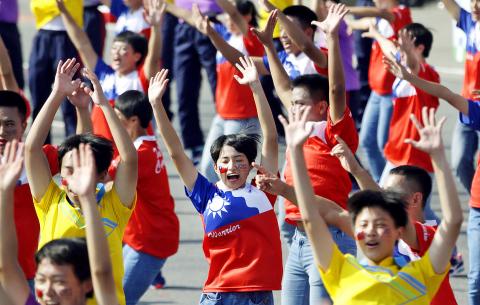President Tsai Ing-wen (蔡英文) yesterday in her Double Ten National Day address rejected the “one country, two systems” model proposed by Beijing as the future of cross-strait relations, while highlighting freedom, democracy and sovereignty.
“The overwhelming consensus among Taiwan’s 23 million people is our rejection of ‘one country, two systems,’ regardless of party affiliation or political position,” Tsai said at the ceremony in front of the Presidential Office Building in Taipei.
There would be no space for the existence of the Republic of China (ROC) if that framework were to be imposed on Taiwan, Tsai said, citing the violence in Hong Kong as an example.

Photo: Chiang Ying-ying, AP
As Taiwan’s president, standing up to protect the nation’s sovereignty is not a provocation to China, but a fundamental responsibility, she said, urging the public to stand with her in defending freedom and democracy.
Tsai said the term “Republic of China (Taiwan)” is an overwhelming consensus of Taiwanese society and not the exclusive property of any particular political party.
Touting her political achievements over the past three years, Tsai then outlined her goals, which are to unite people under the flags of freedom and democracy to defend sovereignty; to boost the nations’s economic power and national strength; and to overcome challenges and make the nation confident and proud of itself on the global stage.
Legislative Speaker Su Jia-chyuan (蘇嘉全) in his master-of-ceremonies address said that no totalitarian nation can stop free and democratic Taiwan from establishing new friendships, even though the nation’s diplomacy has been maliciously undermined.
Taiwanese pride could best be embodied by a “free spirit;” human rights are the shared belief of Taiwanese; and a well-developed democratic system has given Taiwanese strength, he said.
On the foundations of democracy, freedom and human rights, the nation has attained steady economic growth, created a wholesome social climate and won high acclaim for its healthcare system, he said, adding that the nation has also befriended many like-minded nations.
In a sense, as people make efforts to safeguard democracy, democracy is safeguarding them, Su said.
During his more than three years in office he has received 107 groups of lawmakers from other nations and they all expressed amazement at Taiwan’s democracy, Su said.
Although Taiwan faces many challenges in the international community, and its diplomacy has been maliciously compromised, freedom would ultimately prevail, he said.
The nation has been through colonialism and authoritarianism, but today it embraces democracy and freedom, and that means it is embraced by the rest of the world, he said, attributing this to the suffering, diligence and efforts of all Taiwanese.
Su expressed the hope that Taiwan’s virtues and progressiveness would be seen by the world; that the nation would forever stand unwavering in the Pacific no matter how great its future challenges are; and that future generations enjoy the freedoms enjoyed today and they are able to decide their own future.

The Taiwanese passport ranked 33rd in a global listing of passports by convenience this month, rising three places from last month’s ranking, but matching its position in January last year. The Henley Passport Index, an international ranking of passports by the number of designations its holder can travel to without a visa, showed that the Taiwan passport enables holders to travel to 139 countries and territories without a visa. Singapore’s passport was ranked the most powerful with visa-free access to 192 destinations out of 227, according to the index published on Tuesday by UK-based migration investment consultancy firm Henley and Partners. Japan’s and

NATIONAL SECURITY THREAT: An official said that Guan Guan’s comments had gone beyond the threshold of free speech, as she advocated for the destruction of the ROC China-born media influencer Guan Guan’s (關關) residency permit has been revoked for repeatedly posting pro-China content that threatens national security, the National Immigration Agency said yesterday. Guan Guan has said many controversial things in her videos posted to Douyin (抖音), including “the red flag will soon be painted all over Taiwan” and “Taiwan is an inseparable part of China,” while expressing hope for expedited “reunification.” The agency received multiple reports alleging that Guan Guan had advocated for armed reunification last year. After investigating, the agency last month issued a notice requiring her to appear and account for her actions. Guan Guan appeared as required,

Japan and the Philippines yesterday signed a defense pact that would allow the tax-free provision of ammunition, fuel, food and other necessities when their forces stage joint training to boost deterrence against China’s growing aggression in the region and to bolster their preparation for natural disasters. Japan has faced increasing political, trade and security tensions with China, which was angered by Japanese Prime Minister Sanae Takaichi’s remark that a Chinese attack on Taiwan would be a survival-threatening situation for Japan, triggering a military response. Japan and the Philippines have also had separate territorial conflicts with Beijing in the East and South China

A strong cold air mass is expected to arrive tonight, bringing a change in weather and a drop in temperature, the Central Weather Administration (CWA) said. The coldest time would be early on Thursday morning, with temperatures in some areas dipping as low as 8°C, it said. Daytime highs yesterday were 22°C to 24°C in northern and eastern Taiwan, and about 25°C to 28°C in the central and southern regions, it said. However, nighttime lows would dip to about 15°C to 16°C in central and northern Taiwan as well as the northeast, and 17°C to 19°C elsewhere, it said. Tropical Storm Nokaen, currently